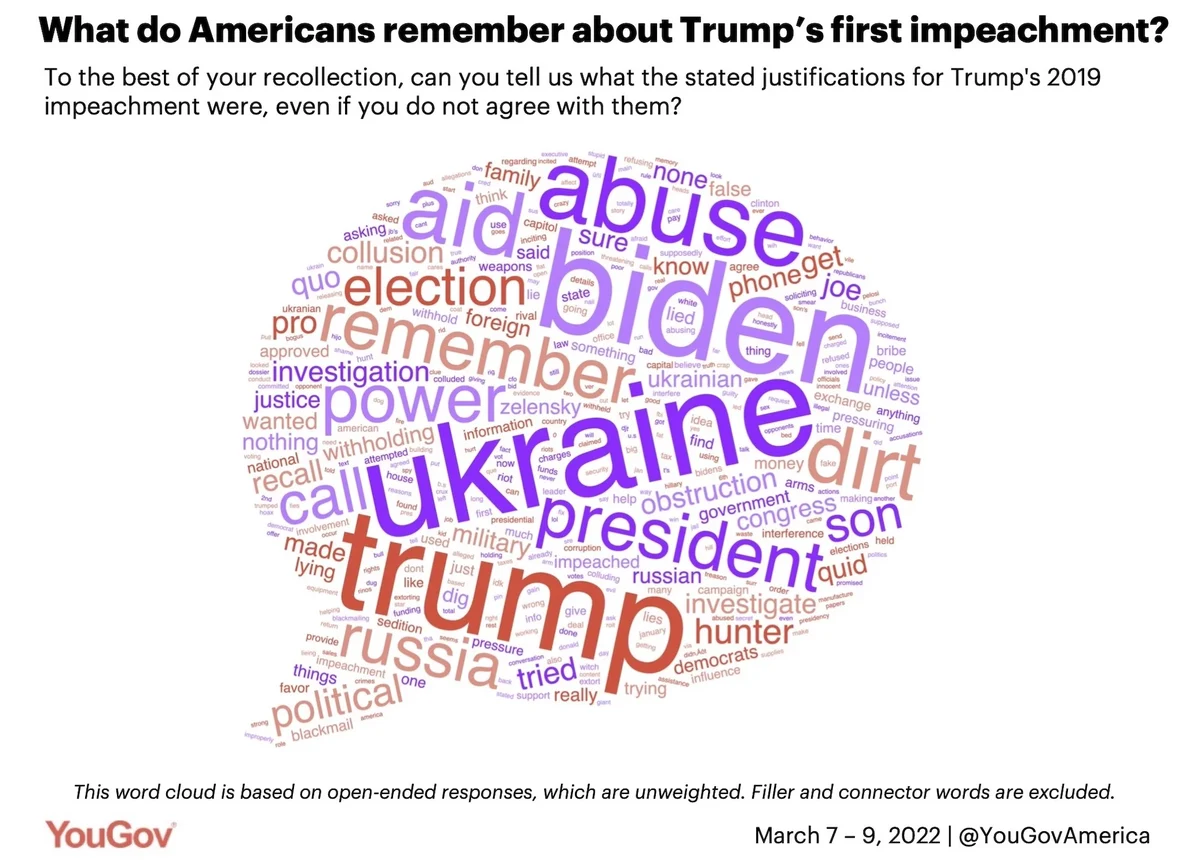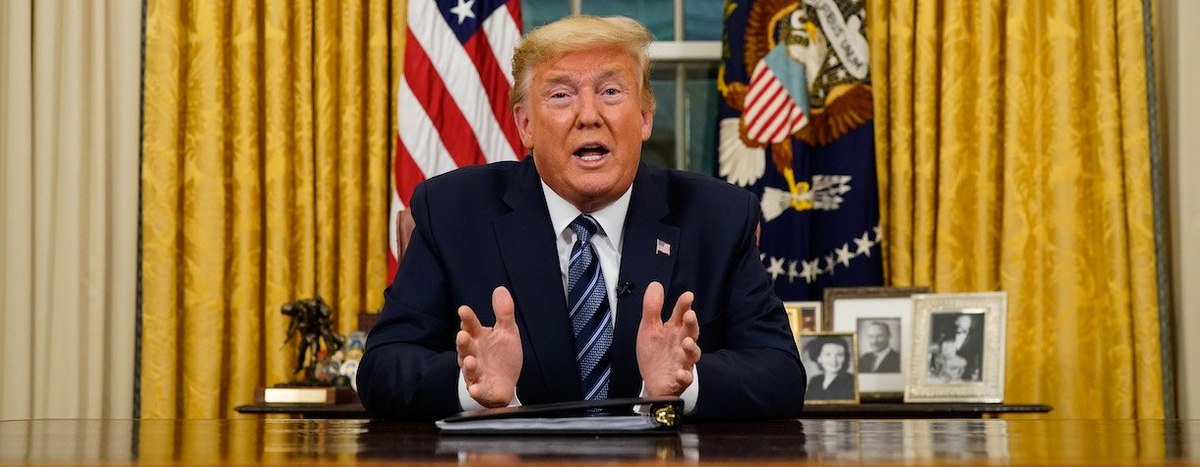Russia and Ukraine arose as key players at various points in Trump’s presidency. In a recent survey, YouGov explored American opinions on Trump’s relationships with these two nations — now and when he was in the White House.
Trump’s overall stance on Russia and Ukraine
While the vast majority of Americans — including both Democrats (84%) and Republicans (80%) — sympathize with Ukraine over Russia in the recent conflict, more Americans believe that Trump sympathizes with Russia (37%) than with Ukraine (22%). Among Republicans who side with Ukraine, 54% say that Trump also sympathizes with Ukraine. A mere 8% of Democrats who are sympathetic to Ukraine say that Trump sympathizes with Ukraine.
Four in ten Americans (42%) say that as president, Trump was too friendly toward Russia, while slightly fewer (37%) say his approach was about right, and 5% say it was too hostile. Americans are 11 percentage points less likely to say Joe Biden is too friendly to Russia, and 6 percentage points more likely to say he is too hostile (11%). Most Republicans and Democrats view their party’s most recent president as ‘about right’ in their stance toward Russia, while viewing the other party’s most recent president as too friendly.
Trump’s 2019 call with Zelensky and impeachment
In December 2019, Trump was the third president in American history to be formally impeached by Congress. Do Americans remember the reason why? Half now say they remember “a lot” about Trump’s first impeachment; 35% say they remember “a little” about it and 15% say they remember “nothing at all” about it.
When asked in an open-ended question why Trump was impeached in December 2019 (before being given more information), a majority of people could not recall. As one respondent put it: “I followed it when it happened, but my memory fails me now as to what it was for. I know I was in favor of it.” Of the 864 people who responded to the question, about 25% mentioned Ukraine or Zelensky (3% mentioned him by name), 15% mentioned Joe or Hunter Biden, 11% mentioned Russia, and 10% mentioned abuse of power or obstruction of justice.

When asked about the specifics of Trump’s call with Zelensky, 32% say they remember hearing “a lot” about Trump withholding military aid to Ukraine and urging Zelensky to investigate allegations of corruption against the Biden family; the same share (32%) say they remember hearing “nothing at all” about this. Only one in four Republicans remember hearing a lot about the call with Zelensky; a significantly larger share, 38%, don’t remember hearing anything about it.
Two in five Americans (39%) say that Trump withheld military aid to Ukraine; a smaller share, 28%, say he didn’t. Among Democrats, 65% say Trump withheld aid and 11% say he didn’t; those percentages are 19% and 50% for Republicans. Compared to when we asked this question in 2019, Republicans are now a lot less confident that Trump didn’t withhold aid, while Democrats are less confident that he did.
Among Americans who say Trump did withhold aid, 83% say doing so was inappropriate, compared to just 13% who say it was appropriate. Americans were slightly more likely to say that impeachment on this charge was justified (41%) than to say it was not justified (37%). While 75% of Democrats say impeachment was justified, only 12% of Republicans say it was.
Foreign interference in the 2016 U.S. Presidential Election
A greater share of Americans say that Russia interfered with the 2016 U.S. Presidential election than the share that say it didn’t. Americans are evenly divided (39% to 40%) on whether or not Trump coordinated with Russia in 2016 to benefit his presidential campaign. They are also divided (36% to 40%) on whether or not Trump obstructed investigations of the Russian government’s efforts to interfere in the election.
A mere 9% of Americans — including an equal share of Democrats and Republicans — say that Ukraine interfered in the 2016 U.S. presidential election (a theory pushed by Trump and referenced in the articles of impeachment against him). In November 2019, an Economist/YouGov Poll found that more Americans - both Democrats and Republicans - believed Ukraine interfered in the 2016 election than believe so now.
Teaming up with Putin on cyber security
In 2017, Donald Trump said on Twitter that he discussed forming a cyber security unit to guard against election hacking with Russian President Vladimir Putin. In our latest poll we asked Americans whether this would’ve been a good idea or a bad idea and found it is regarded as a bad idea by a margin of two to one. People who voted for Trump in 2020 are just as likely to say it would've been a good idea (31%) as a bad idea (31%).
Readmitting Russia to the G7
In 2014, Russia was indefinitely suspended from the annual Group of 7, or G7, summit of world leaders after the annexing of Crimea from Ukraine. In 2018, Trump called for Russia’s readmittance to the G7, a proposal that was rejected by other member countries. When asked about this idea in 2018, 39% of Americans opposed it, while 20% supported it. Now, 58% of Americans oppose readmitting Russia to the G7, while only 12% support doing so. Republicans are especially likely to have changed their tune. In 2018, only 19% opposed the proposal; today, 60% oppose it. The 2018 question tied the idea to Trump, while the 2022 one didn’t, which might explain some of the difference.
Trump’s recent statements on Russia
A recent Economist/YouGov Poll asked Americans whether it was appropriate or inappropriate for U.S. leaders to praise Vladimir Putin. Only one in ten Americans — including 9% of Democrats and 13% of Republicans — said it was appropriate, while 67% said it was not.
In the days leading up to Russia’s invasion of Ukraine, Trump praised Putin as “savvy” and called Putin’s justification for invading Ukraine “genius.”
To understand how Americans feel about these statements, we recently conducted an experiment in which we asked Americans how closely these views matched their own (half were told the statements were Trump’s and half were not told this). The results suggest that few Americans — Democrats or Republicans — consider Putin savvy, nor do they consider his justification for invading Ukraine to be genius. Americans are evenly divided over the statements “The problem is not that Putin is smart, which of course he is smart, but the real problem is that our leaders are dumb” and “If Donald Trump were in office, this deadly Ukraine situation would never have happened.”
- Carl Bialik and Linley Sanders contributed to this article
See the toplines and crosstabs for this U.S. News Poll
Methodology: This U.S. News survey was conducted by YouGov using a nationally representative sample of 1,000 U.S. adult citizens interviewed online between March 7 - 9, 2022. This sample was weighted according to gender, age, race, and education based on the 2018 American Community Survey, conducted by the U.S. Census Bureau, as well as 2016 and 2020 Presidential votes (or non-votes). Respondents were selected from YouGov’s opt-in panel to be representative of all U.S. citizens. The margin of error is approximately 3% for the entire sample.








